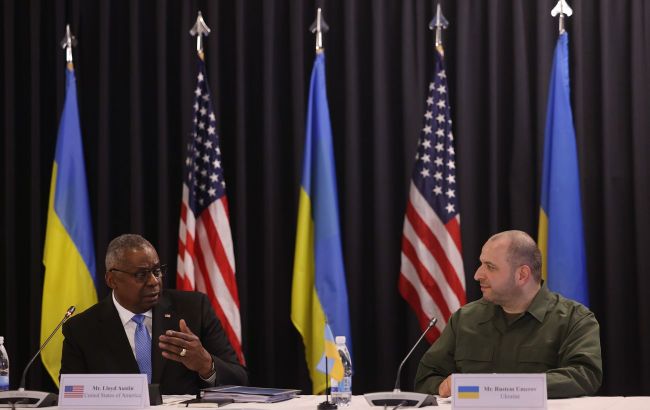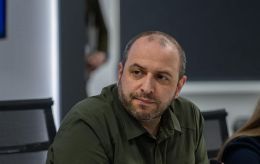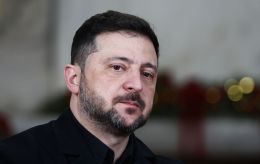Ramstein-19 will take place on February 14: Details of negotiations on Ukraine
 Photo: talks in Rammstein format (Getty Images)
Photo: talks in Rammstein format (Getty Images)
Today, on February 14th, the military coalition in support of Ukraine is gathering for negotiations in the Ramstein format. The 19th meeting of allies at NATO headquarters in Belgium was supposed to be led by the head of the Pentagon, Lloyd Austin. However, he canceled his visit to Brussels due to hospitalization, so the negotiations will take place online.
RBC-Ukraine has compiled everything currently known about the Ramstein-19 meeting.
The preparation involved the use of information from the official NATO portal and negotiation program, publications from Handelsblatt and Reuters, a briefing by Pentagon press secretary Pete Ryder, a statement by U.S. President Joe Biden on the White House website, and a statement by Ukraine's mission to NATO, Natalia Galibarenko.
Meeting agenda
The next Ramstein negotiations were announced for February 14th at NATO headquarters in Brussels – one day before the meeting of defense ministers from Alliance countries.
According to the event schedule, a press conference by NATO Secretary-General Jens Stoltenberg will begin at 12:00 p.m. (Kyiv time). At 2:30 p.m., the arrival of ministers and their brief statements is expected, and at 3:30 p.m., the meeting of the Contact Group on Ukraine's defense matters will commence.
The negotiations of the allies will take place in a hybrid format, combining virtual and in-person participation.
Will the U.S. representative be present at Ramstein
U.S. Secretary of Defense Lloyd Austin initially planned to personally lead the Ramstein meeting in Brussels, but on February 12th, it was announced that he would not attend due to hospitalization.
However, Austin may still join the allies via video conferencing. The Pentagon's press service stated that the Secretary "plans to participate in the meeting" in an online format. However, this depends on his health during the meeting.
Moreover, the U.S. side at Ramstein-19 will be represented by the Chairman of the Joint Chiefs of Staff, Charles Brown, and the Assistant Secretary of Defense for International Security Affairs at the Pentagon, Celeste Wallander.
It's worth noting that in December 2023, the head of the Pentagon was diagnosed with cancer. On January 1st, Lloyd Austin was hospitalized due to complications after a routine medical procedure. He returned to work in mid-January, but on February 12th, he was hospitalized again due to a urinary issue.
Change in format: Ramstein wants to be integrated into NATO
Before the meeting, information surfaced in the media that NATO is considering the possibility of taking over the coordination of arms supplies to Ukraine.
This would represent a change in the format of the Contact Group's work, as the Alliance had not previously directly intervened in supply issues, leaving them to the discretion of individual member countries.
The leadership of the bloc aims to integrate the Ramstein format into the structures of the Alliance. This decision may be an attempt to safeguard against potential changes in U.S. policy.
There are concerns within NATO that arms supplies to Ukraine from the U.S. could cease if Donald Trump wins the elections in November.
The plan for integration was developed by Jake Sullivan, the national security advisor to the President of the United States, and Jens Stoltenberg, the Secretary-General of the Alliance.
Aid from allies
Delay in U.S. funding
Ramstein-19 is taking place against the backdrop of uncertainty regarding assistance from the U.S. A bill regarding funding for the military needs of Ukraine and Israel has been stuck in Congress for almost four months.
However, progress was made on February 13, 2024. The Senate approved a version of the bill that allocates over $60 billion for Ukraine. For the law to take effect, it still needs to be voted on in the House of Representatives and signed by President Joe Biden.
Speaker of the House of Representatives, Republican Mike Johnson, is critical of the bill and may not bring it to the House floor for consideration.
President Joe Biden, on his part, called on the House of Representatives to "take immediate action" and send the bill to him for signing. According to him, the U.S. can no longer afford to wait, as the cost of inaction is rising every day, especially in Ukraine.
"Already, we are seeing reports of Ukrainian troops running out of ammunition on the front lines as Russian forces continue to attack and Putin continues to dream of subjugating the Ukrainian people," added the president.
He emphasized that if the U.S. does not stand against tyrants seeking to conquer their neighbors, the consequences for the country's national security will be significant, and allies will take note.
Transfer of F-16s
A report on the transfer of F-16 fighter jets will be presented at Ramstein on February 14. According to Ukraine's ambassador to NATO, Natalia Galibarenko, the outcome of the meeting may include the announcement of the timeline for when the aircraft will appear in the Ukrainian sky.
"Perhaps there will be some more detailed information, but for now, everything is going according to plan. Spring 2024 is a realistic timeframe that has been mentioned," noted Galibarenko.
She mentioned that the preparation for using F-16s is taking place on multiple levels. Pilots are being trained in English and in the operation of the aircraft. Training is also being conducted for the personnel who will service the aircraft, and infrastructure preparation is underway.
The U.S. and NATO discuss increasing arms production for Ukraine
At the end of January, Pentagon chief Lloyd Austin and NATO Secretary-General Jens Stoltenberg held talks on military aid to Ukraine, specifically addressing the urgent need to increase weapons production.
Austin and Stoltenberg emphasized the importance of maintaining NATO unity in supporting Ukraine. They also agreed that rapidly increasing defense production is critically important for providing further assistance to Kyiv in replenishing ammunition and equipment stocks.
France promises to expand assistance
One week before Ramstein, French Prime Minister Gabriel Attal stated that his country intends not only to increase financial aid to Ukraine but also to expand the range of weapons provided.
"This commitment (to military assistance to Ukraine) will obviously increase, not only in terms of the finances allocated, but also in terms of the nature of the weapons, which obviously must be of the highest standard necessary for Ukrainians to be able to defend themselves," added Attal.
The head of the French government reminded that his country is providing Ukraine with state-of-the-art weaponry. This includes long-range Scalp missiles, Caesar howitzers, light tanks AMX-10 RC, as well as AASM bombs.
How the previous Ramstein meeting unfolded
The previous meeting of the Contact Group on Ukraine's defense in the Ramstein format took place online on January 23.
Pentagon Chief Lloyd Austin urged participants in the meeting to provide the Ukrainian Armed Forces with "more life-saving ground-based air defense systems and interception means." He stated that allies need to focus on Ukraine's long-term needs.
Ukrainian Minister of Defense Rustem Umerov at the Contact Group meeting outlined what the Armed Forces of Ukraine need for a breakthrough. He noted that sufficient quantities of equipment and ammunition, technical maintenance, and spare parts are "critically important components of success," but the breakthrough will be possible through the introduction of innovations and technological progress.
At the end of the meeting, Defense Ministry spokesperson Illarion Pavliuk revealed that Ukraine would receive weapons it did not have before, helping strike the enemy and logistic nodes.

